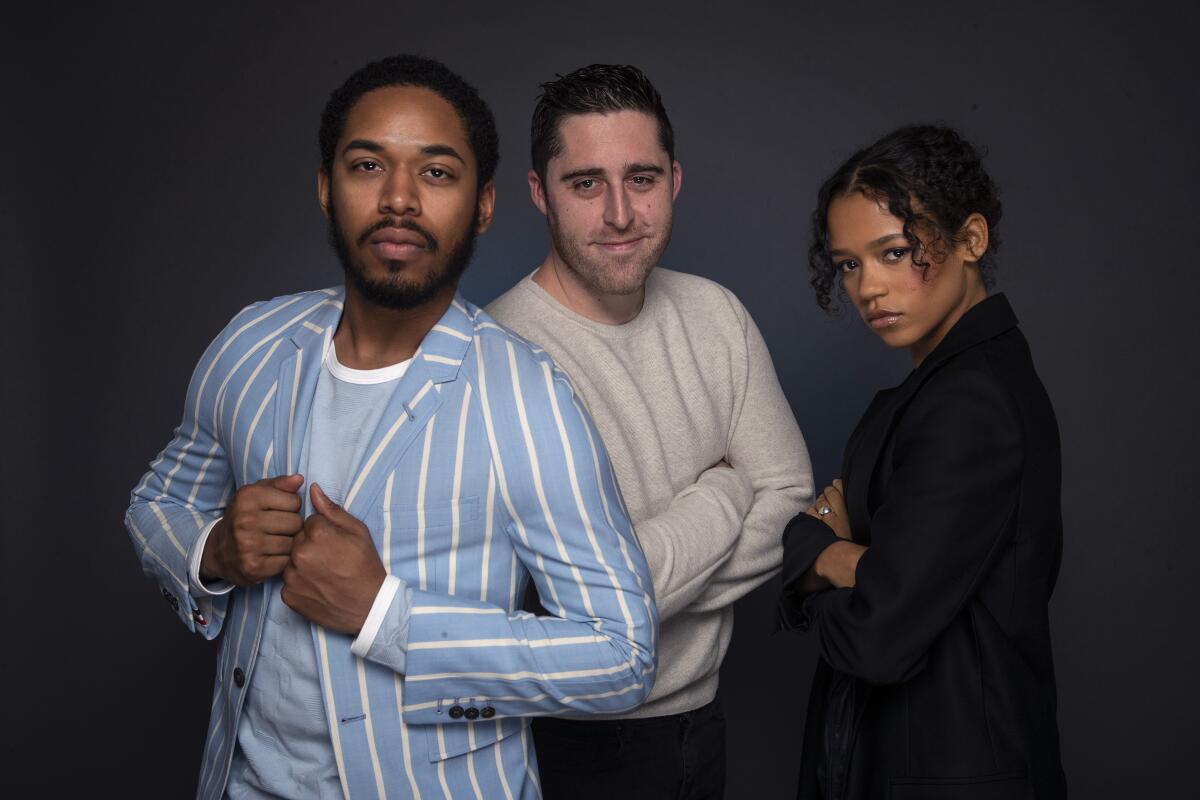‘Waves’ cast draws on life experiences to create story of family trauma

- Share via
Nearly 40 years after the release of “Ordinary People,” which remains one of American film’s most moving, wrenching and resonant family dramas, comes writer-director Trey Edward Shults’ “Waves,” another acclaimed, affecting portrait of familial trauma that bears more than a passing resemblance, in all the best ways, to 1980’s Oscar-winning picture.
“Waves” involves a successful Florida family — dad Ronald (Sterling K. Brown), mom Catherine (Renée Elise Goldsberry), and their teenage kids: volatile wrestling champ Tyler (Kelvin Harrison Jr.) and the younger, quieter Emily (Taylor Russell) — whose seemingly well-ordered existence explodes in an unexpected and devastating way. Lucas Hedges costars as Emily’s kindly new boyfriend, Luke.
Although “Waves” may be more audio-visually kinetic, racially diverse and uniquely structured than “Ordinary People,” it powerfully evokes that film’s deep-rooted parent-child tensions, coming-of-age hurdles, crisis-laced dynamics and a complex web of love, guilt, pain and redemption.
Recently, over quiche, protein drinks and wellness juice shots at a West Hollywood hotel, Shults (“Krisha,” “It Comes at Night,”), 31, and stars Harrison (“Mudbound,” “Luce”) and Russell (“Escape Room”), both 25, spoke with thoughtful enthusiasm about their personal connections to the family in “Waves.”
Trey, your films are all about family in one way or another. Can you talk about the conception of “Waves” and how its family story evolved?
Aspects of it had been brewing in me forever, starting with music and images, and not really knowing what it was. And then it kind of became Tyler’s story. But by the time I met Kel [Harrison, when he acted in “It Comes at Night”] it became about a brother and a sister linked by a tragedy, and their family and lovers.
It’s deeply, deeply personal, drawing on things loved ones and I have lived. But the story grew bigger than me as I started talking things out with Kel: our past experiences, how we were at Tyler’s age, relationships with our families. Then [that process] continued with the other actors.
Kel, I read that when you were a teen you and your dad had similar sorts of conflicts as Tyler has with his father.
My dad [jazz artist Kelvin Harrison Sr.] is an insanely good musician so he really wanted me to be the best jazz pianist and trumpet player that I could be. But the practice and performing [proved so rigorous] … that I finally told him, “This is not fun anymore. It’s not a hobby, it’s not setting me up for anything. It’s making me resent you as a person and it’s making me resent this craft.” I wanted to do music, just not that music.
Did you draw on that during the film’s competitive father-son scenes? I’m thinking specifically about those intense arm-wrestling and weight-training sequences.
I did. I would practice saxophone with my dad sometimes. I remember always wanting to keep up with him, but he’s so talented that to even try to process that was just, “I don’t get it — on an intellectual level or on an artistic level. I’m just not there and I don’t know if I’ll ever get there.”
Also, my dynamic with Sterling had its own … thing because I looked at him in kind of the same way I looked at my dad. I was just so enamored by his presence that things took on this competitive nature: me trying to appease him, make him feel like I was worth his time, that I was valued in a certain way. The relationships all kind of meshed together.
Taylor, why do you think Emily reacts to the world around her so differently than her brother?
Emily could be really angry at her parents for not paying enough attention to her, for being so hyper-focused on Tyler. But I think that her capacity for forgiveness is immense. She has this ability to really see her parents for who they are, to be easy on them and to forgive them.
In my personal life, I was an Emily type: I kind of fell into the background too, just based on the needs of my brothers. In hindsight, it did make me a different kind of person and more independent, which I think it also makes Emily.
Trey, let’s talk about the fishing scene with Emily and her dad where they finally communicate about Tyler. It’s one of the best moments in the film. What was the inspiration?
I had a relationship with my stepdad that in some ways was like Tyler and his dad’s, with a lot of pent-up resentment. One day, when I was 25 or 26, he just opened up and was vulnerable in a way that I’d never seen before. There was no parent-child judging, just two people purely trying to understand each other.
It broke barriers and created a whole new relationship between us after he raised me for over 20 years. It just makes your parent that much more human when they’re that vulnerable with you.
Taylor, how much do you think both your and Luke’s difficult family situations bring you together?
I think these two people mirror each other in what they need and that’s definitely something that bonds them. Trauma sticks in your brain in a way that you just filter everything and choose people through that lens.
There’s also this gorgeous lightness that Luke brings into Emily’s life that allows her to be a teenager again and she gives him this beautiful gift of healing. There’s a lot that they give each other that’s very buoyant and not dysfunctional at all. And it’s really beautiful to see how they kind of flourish together through all this pain.
More to Read
Only good movies
Get the Indie Focus newsletter, Mark Olsen's weekly guide to the world of cinema.
You may occasionally receive promotional content from the Los Angeles Times.









